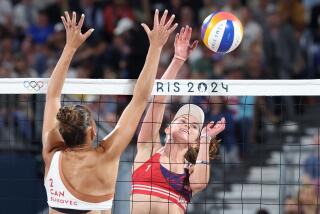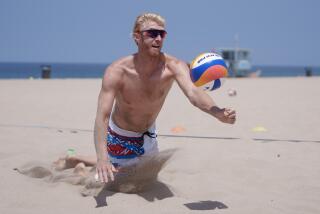Blame It On Rio : When It Comes to Playing on Sand, Brazilian Team Has Found a Home on U.S. Pro Beach Volleyball Tour
- Share via
Anjinho is a cartoon character in Brazil with curly hair and deep blue eyes. In Portuguese, Anjinho means little angel.
Anjinho is also Eduardo Bacil’s nickname. Although Bacil is known to be kind and gentle away from a volleyball court, there is nothing angelic about him when he’s playing.
Bacil has emerged on the U.S. pro beach tour with Brazilian partner Jose Loiola. They are the first foreign team to have an impact on the Assn. of Volleyball Professionals tour.
“There have never been two guys together as good as the Brazilians,” said Chris Marlowe, a former U.S. Olympian and longtime beach player who is a TV anchor on AVP matches. “Everyone’s scared to play them.”
The 6-foot-2 Bacil, a 22-year-old setter who played on the Brazilian junior and national teams, has been earning plaudits for his defense.
Loiola, 23, is a 6-foot-4 hitter with a powerful serve and the ability to spike the ball with the AVP’s best players.
They met as teammates on a Brazilian club team in 1989.
“This is the first international team to even begin to challenge Americans on our home turf,” said Kent Steffes, who teams with Karch Kiraly to form the AVP’s top-ranked team. “They’re a typical Brazilian team. They’re quick and really powerful and they hit sharp, hard balls.”
Bacil and Loiola have spent most of their careers playing indoors, but have adapted to playing on sand. Last year they were Brazil’s best two-man beach team and they won the South American Championships, a four-tournament series.
Kiraly and Steffes, winners of 12 of 16 AVP events, form the only highly regarded AVP team that Bacil and Loiola have not defeated this season.
“They can win a tournament any weekend,” Steffes said.
Bacil and Loiola reached the final of Ft. Worth Open on May 15, but lost to Kiraly and Steffes. They finished third at Ocean City, Md. and fourth at Austin, Tex., and San Diego.
Bacil and Loiola, natives of Rio de Janeiro, have consistently finished in the top 10 since their second
AVP tournament in Pensacola, Fla., on April 4. They each have won close to $35,000 in prize money.
Marlowe believes Bacil and Loiola can bring their game to the highest level.
“They should be in the top four every week,” Marlowe said. “But they’re a typical Brazilian team; when they’re hot and on and feeling good they can roast you and tear you apart. But when they get mad and down they get on themselves and on each other so they’re not as consistent.”
The players’ frustration might be attributed to adjusting to the rules and style of play in the U.S. beach game.
“The game is different here,” Loiola said through an interpreter. “They play so fast. The (nine-minute clock the AVP adopted for television) is tough and setting is stricter. They have 10 years ahead here that we have to learn in one summer.”
“It’s very hard here,” Bacil said. “The game is very competitive, more than in Brazil. There volleyball is strong indoors, but not so much on the beach.”
Bacil and Loiola felt they were ready for the AVP after finishing second to Steffes and Adam Johnson at the Federation of International Volleyball World Championships in Rio in February. Bacil-Loiola earned instant international credibility after defeating Sinjin Smith and Randy Stoklos in the semifinals of that event.
Smith is the winningest player in pro beach history with 134 career open titles. Stoklos is second with 116.
“Every time Brazil has championships, Americans go down there and kill everybody,” Loiola said. “Once we started beating American teams, everyone thought the Americans were not so hot. That first fear is gone and maybe more teams will come out here.”
After playing in their first two AVP events, Bacil and Loiola decided to pack what few personal belongings they had and move to Southern California to train with the world’s top players.
They rented an apartment in El Segundo from pro beach veteran Tim Hovland and began working out in Manhattan Beach. They recently bought a car and moved to a house in El Segundo that they also rent from Hovland.
“The lifestyle here is good, but there’s too many laws for Brazilians,” said Bacil, who speaks broken English. “You can’t drink and drive and you pay taxes for everything. Also, if you ride your bike the wrong way you get a ticket and if you cross the street wrong you get a ticket.”
Loiola says the language barrier has been the toughest adjustment. “English is so hard,” he said. “I never talked English before in my life. It’s so different.”
Loiola and Bacil miss home so much they made $600 worth of phone calls in June.
Their decision to compete in the AVP also led to a suspension from competition in Brazil this winter.
FIVB, the international governing body of volleyball, apparently considers the AVP a rival organization and made the ruling against Bacil and Loiola. The Brazilian beach tour, which runs from June to February, is governed by FIVB.
“Brazilian newspapers call us all the time wondering if we’re going to go back,” Bacil said. “Hopefully, if we do good here, they will allow us back.”
Bacil and Loiola say they will spend the winter training in Rio and deny reports of a breakup.
“Everyone wants us to split,” Loiola said. “They start rumors so maybe we’ll argue and turn against each other and break up. We have so much more to achieve together.”
Bacil says he couldn’t imagine playing without his longtime confidant.
“Our friendship and support system is the most important thing right now,” he said. “We complement each other in every area.”
More to Read
Sign up for Essential California
The most important California stories and recommendations in your inbox every morning.
You may occasionally receive promotional content from the Los Angeles Times.













